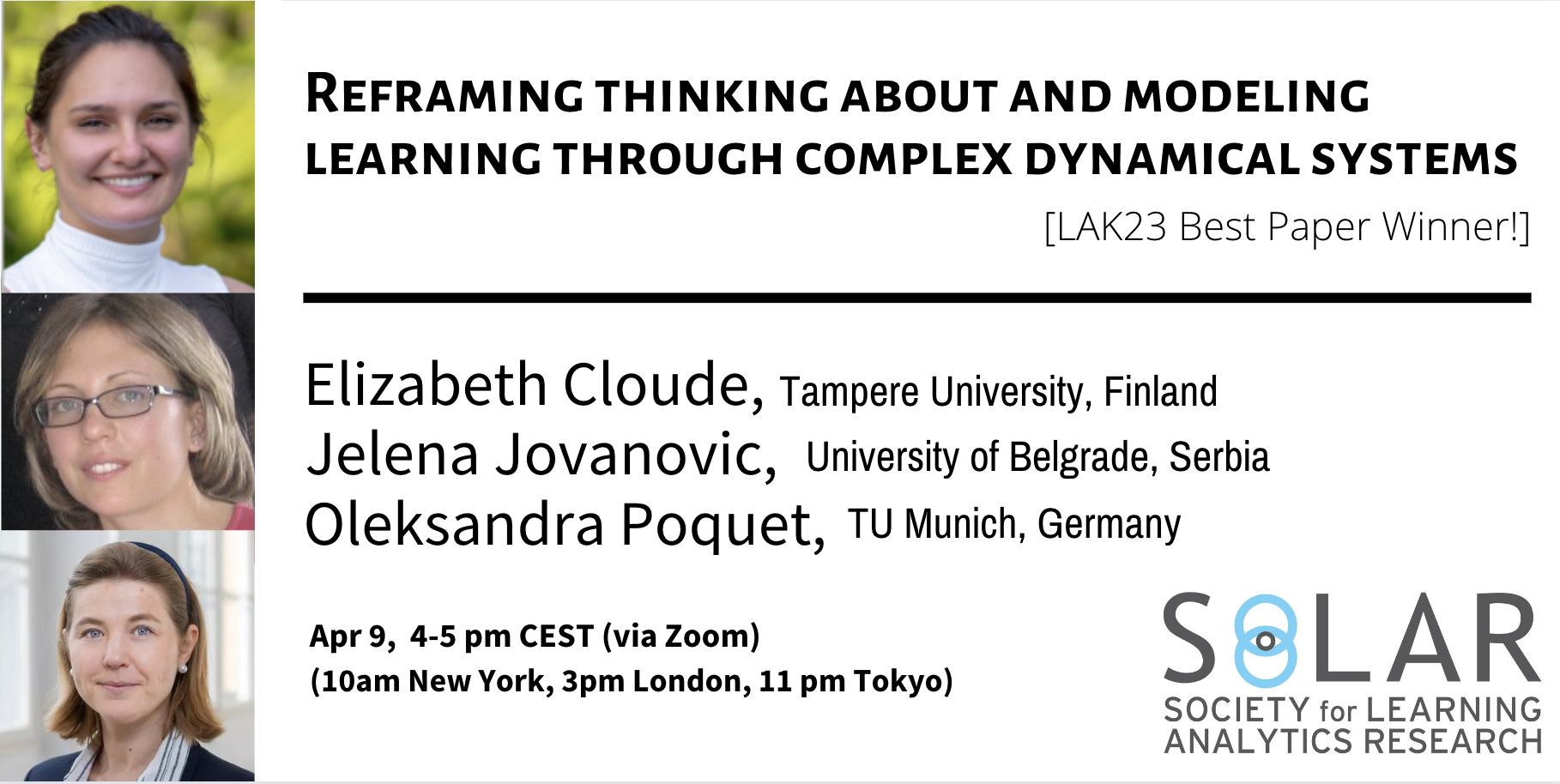Register for the Next SoLAR Webinar, April 9 at 4 PM CEST
April 3, 2024
Title: Reframing thinking about and modeling learning through complex dynamical systems
Learning is a highly individual process of change that emerges from multiple interacting components (e.g. cognitive, social) that occur at varying levels (e.g., individual, group) and timescales (e.g. micro, meso, macro) in constantly changing environments. Due to its complexity, the theoretical assumptions that describe learning are difficult to computationally model, and many existing methodologies are limited by conventional statistics that do not adhere to these assumptions. In recent years, the learning analytics community has explored the potential of complex dynamical systems for modeling and analyzing learning processes. Complex dynamical systems (CDS) approach refers to theoretical views, largely from physics and biology, that preserve the complexity of learning and could be potentially useful in studying socio-/ technical-/ material-/ symbolic systems that learn.
The integration of CDS into analytical and methodological tenets of LA research is ongoing. Yet, CDS concepts and accompanying methods remain mostly “under the radar” of a larger learning analytics community. In this webinar, we will introduce the main theoretical underpinnings and methodological toolkit of CDS, and highlight their relevance to and potential integration with learning analytics. We will present key opportunities for thinking about and modeling learning through CDS concepts and briefly review CDS-inspired research from works-in-progress presented at the latest workshop on CDS in learning analytics.
Presenters:
Elizabeth Cloude, Tampere University | Jelena Jovanovic, University of Belgrade | Oleksandra Poquet, Technical University of Munich
Bios
Elizabeth B. Cloude is a recipient of the Marie Skłodowska-Curie Postdoctoral Fellowship funded by the European Union and is affiliated with the Faculty of Education and Culture and Gamification Group at Tampere University in Finland. Elizabeth’s research specializes in studying self-regulated learning as a non-linear dynamical system with educational technologies. Her focus is on collecting, processing, and analyzing multimodal data (e.g., eye movements, log files, physiology, concurrent verbalizations, facial expressions of emotions) to study the complex nature of learning and emotions across activities to build adaptive, intelligent systems. She was previously a postdoctoral scholar within the Penn Center for Learning Analytics at the University of Pennsylvania and holds a Ph.D. from the University of Central Florida. Elizabeth has contributed to various peer-reviewed publications, including the Cognitive Science Society, International Learning Analytics and Knowledge Conference, European Association for Research on Learning and Instruction, and IEEE Transactions on Affective Computing.
Jelena Jovanovic is a Professor at the Department of Software Engineering, University of Belgrade, Serbia. She is also an Adjunct Professor in the Centre for the Science of Learning & Technology (SLATE) at University of Bergen, Norway, and an Adjunct Professor in the Centre for Learning Analytics at Monash (CoLAM), Monash University, Australia. Her current research focus is on the use of computational approaches, including statistical and machine learning methods and techniques, network analysis, and text analytics, towards better understanding and supporting learning, primarily self-regulated learning in higher education settings. Currently she serves as Advisor to the Editor-in-Chief of IEEE Transactions on Learning Technologies and Editorial Board member of Journal of Learning Analytics, Journal of Educational Data Mining, and Computers & Education: Artificial Intelligence. She has been one of the faculty leads for the three latest Doctoral Consortia at the Learning Analytics and Knowledge conference.
Oleksandra Poquet (Sasha Poquet) is a tenure-track professor in learning analytics at the School of Social Sciences and Technology, Technical University of Munich in Germany. She leads a LEAPS research group that studies Learning Analytics and Practices in Systems. Her current research focuses on creating impactful technology-based interventions using learning analytics that support agency and social networks in higher education and workplace training. Prof Poquet is a core member of the Munich Data Science Institute and an affiliate of the Centre for Change and Complexity in Learning, University of South Australia.

